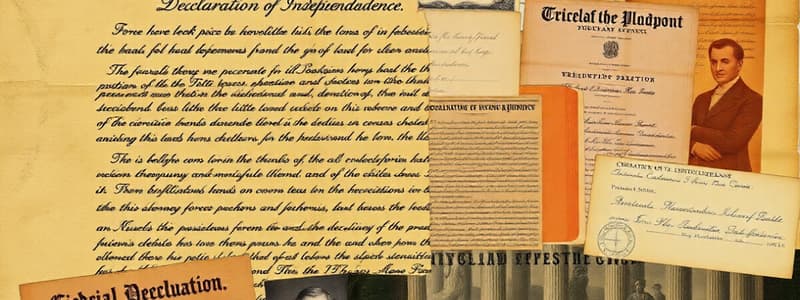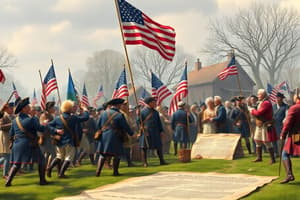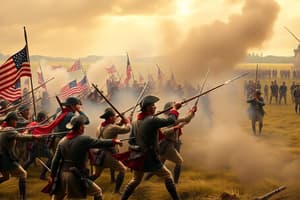Podcast
Questions and Answers
Which of the following is NOT a basic requirement of procedural due process?
Which of the following is NOT a basic requirement of procedural due process?
- Notice
- Right to a speedy trial (correct)
- Impartial decision maker
- Opportunity to be heard
What is the primary purpose of substantive due process?
What is the primary purpose of substantive due process?
- To determine if the government's power to restrict individuals' rights is justified. (correct)
- To ensure that the government follows fair procedures when taking action against individuals.
- To guarantee that individuals have a fair chance to present their case in court.
- To prevent the government from taking property without just compensation.
In the context of Due Process, what does "life, liberty, or property" refer to?
In the context of Due Process, what does "life, liberty, or property" refer to?
- Encompassing a broader range of rights and interests including personal autonomy, reputation, and economic opportunities. (correct)
- Solely the rights guaranteed by the Constitution, such as freedom of speech, religion, and the press.
- Only referring to physical life, freedom from imprisonment, and ownership of tangible assets.
- Exclusively related to the rights of citizens, not applicable to non-citizens or legal residents.
Which amendment(s) to the Constitution guarantee Due Process of Law?
Which amendment(s) to the Constitution guarantee Due Process of Law?
What is the relationship between the level of interest a person has at stake and the level of procedural due process required by the government?
What is the relationship between the level of interest a person has at stake and the level of procedural due process required by the government?
Which example best demonstrates a situation where substantive due process would be most relevant?
Which example best demonstrates a situation where substantive due process would be most relevant?
Which of the following is NOT an example of a procedural due process protection?
Which of the following is NOT an example of a procedural due process protection?
What is the core idea behind the principle of "due process of law"?
What is the core idea behind the principle of "due process of law"?
Which of the following scenarios exemplifies a violation of substantive due process?
Which of the following scenarios exemplifies a violation of substantive due process?
What is the primary function of procedural due process?
What is the primary function of procedural due process?
Which of the following best describes the concept of equal protection under the Fourteenth Amendment?
Which of the following best describes the concept of equal protection under the Fourteenth Amendment?
Which of the following rights has been recognized by the courts as a fundamental right, receiving heightened protection against government interference?
Which of the following rights has been recognized by the courts as a fundamental right, receiving heightened protection against government interference?
What is the key distinction between substantive due process and procedural due process?
What is the key distinction between substantive due process and procedural due process?
What is the main purpose of the Equal Protection Clause of the Fourteenth Amendment?
What is the main purpose of the Equal Protection Clause of the Fourteenth Amendment?
How does the Equal Protection Clause relate to the concept of substantive due process?
How does the Equal Protection Clause relate to the concept of substantive due process?
Which of the following statements accurately describes the relationship between the right to privacy and the Constitution?
Which of the following statements accurately describes the relationship between the right to privacy and the Constitution?
What was the primary purpose of the Declaration of Independence?
What was the primary purpose of the Declaration of Independence?
Which grievance was NOT mentioned in the Declaration of Independence?
Which grievance was NOT mentioned in the Declaration of Independence?
What right do the people have when a government abuses its power?
What right do the people have when a government abuses its power?
What is one of the core principles stated in the Declaration of Independence?
What is one of the core principles stated in the Declaration of Independence?
When did the United States Constitution officially take effect?
When did the United States Constitution officially take effect?
Which purpose does the Constitution aim to serve?
Which purpose does the Constitution aim to serve?
Which of the following actions were colonists NOT subjected to under British rule?
Which of the following actions were colonists NOT subjected to under British rule?
What significant event occurred on July 4, 1776?
What significant event occurred on July 4, 1776?
What does the Fourteenth Amendment establish regarding citizenship?
What does the Fourteenth Amendment establish regarding citizenship?
Which right is protected by the First Amendment?
Which right is protected by the First Amendment?
What does the Fourth Amendment require for a search or seizure?
What does the Fourth Amendment require for a search or seizure?
Which amendment guarantees protection against self-incrimination?
Which amendment guarantees protection against self-incrimination?
What does the Eighth Amendment prohibit?
What does the Eighth Amendment prohibit?
What does the Sixth Amendment guarantee to a criminal defendant?
What does the Sixth Amendment guarantee to a criminal defendant?
Which amendment ensures the right to petition the government?
Which amendment ensures the right to petition the government?
What does the Tenth Amendment emphasize about state rights?
What does the Tenth Amendment emphasize about state rights?
What does Article I, Section 11 of the Michigan Constitution state regarding searches and seizures?
What does Article I, Section 11 of the Michigan Constitution state regarding searches and seizures?
In what situation is evidence seized deemed inadmissible in state court under the United States Constitution?
In what situation is evidence seized deemed inadmissible in state court under the United States Constitution?
How does the self-incrimination provision of the Michigan Constitution compare to that of the United States Constitution?
How does the self-incrimination provision of the Michigan Constitution compare to that of the United States Constitution?
What role do police officers play according to the content?
What role do police officers play according to the content?
What is a key goal of constitutional policing?
What is a key goal of constitutional policing?
Which case established a conflict between Michigan and United States Constitution interpretations regarding evidence admissibility?
Which case established a conflict between Michigan and United States Constitution interpretations regarding evidence admissibility?
What does procedural justice emphasize in police duties?
What does procedural justice emphasize in police duties?
Which aspect is NOT a part of the Fourth Amendment as referenced in the content?
Which aspect is NOT a part of the Fourth Amendment as referenced in the content?
What is the primary function of the Constitution?
What is the primary function of the Constitution?
What is the significance of the Declaration of Independence in relation to the Constitution?
What is the significance of the Declaration of Independence in relation to the Constitution?
What type of law is specifically prohibited by the Constitution?
What type of law is specifically prohibited by the Constitution?
Which branch of government is responsible for enforcing laws?
Which branch of government is responsible for enforcing laws?
What is the role of the judicial branch in relation to the Constitution?
What is the role of the judicial branch in relation to the Constitution?
What is the primary function of the Bill of Rights?
What is the primary function of the Bill of Rights?
What is the significance of the case Marbury v. Madison?
What is the significance of the case Marbury v. Madison?
Which of these statements accurately describes the relationship between the Declaration of Independence and the Constitution?
Which of these statements accurately describes the relationship between the Declaration of Independence and the Constitution?
Flashcards
Declaration of Independence
Declaration of Independence
The Declaration of Independence, adopted on July 4, 1776, declared the American colonies independent from Great Britain, granting them the power to govern themselves.
Grievances in the Declaration of Independence
Grievances in the Declaration of Independence
The grievances listed in the Declaration of Independence outlined the abuses and injustices faced by the colonists under British rule, such as unfair taxation, lack of representation, and restrictions on trade.
Core Principles of the Declaration of Independence
Core Principles of the Declaration of Independence
The Declaration of Independence established three core principles: everyone is created equal with certain unalienable rights, government's purpose is to protect these rights, and people have the right to overthrow an unjust government.
U.S. Constitution
U.S. Constitution
Signup and view all the flashcards
Purpose of the U.S. Constitution
Purpose of the U.S. Constitution
Signup and view all the flashcards
Constitution
Constitution
Signup and view all the flashcards
Legislative Branch
Legislative Branch
Signup and view all the flashcards
Executive Branch
Executive Branch
Signup and view all the flashcards
Judicial Branch
Judicial Branch
Signup and view all the flashcards
Bills of Attainder
Bills of Attainder
Signup and view all the flashcards
Ex Post Facto Laws
Ex Post Facto Laws
Signup and view all the flashcards
Bill of Rights
Bill of Rights
Signup and view all the flashcards
Substantive Due Process
Substantive Due Process
Signup and view all the flashcards
Procedural Due Process
Procedural Due Process
Signup and view all the flashcards
Equal Protection
Equal Protection
Signup and view all the flashcards
Privacy Under the Constitution
Privacy Under the Constitution
Signup and view all the flashcards
Dual Citizenship
Dual Citizenship
Signup and view all the flashcards
Due Process of Law
Due Process of Law
Signup and view all the flashcards
Equal Protection of the Laws
Equal Protection of the Laws
Signup and view all the flashcards
What does the Bill of Rights do?
What does the Bill of Rights do?
Signup and view all the flashcards
Freedom of Speech and Press
Freedom of Speech and Press
Signup and view all the flashcards
Freedom of Assembly
Freedom of Assembly
Signup and view all the flashcards
Freedom to Petition
Freedom to Petition
Signup and view all the flashcards
Right to Bear Arms
Right to Bear Arms
Signup and view all the flashcards
Seventh Amendment
Seventh Amendment
Signup and view all the flashcards
Eighth Amendment
Eighth Amendment
Signup and view all the flashcards
Ninth Amendment
Ninth Amendment
Signup and view all the flashcards
Tenth Amendment
Tenth Amendment
Signup and view all the flashcards
Due Process
Due Process
Signup and view all the flashcards
Government's Compelling Reason
Government's Compelling Reason
Signup and view all the flashcards
Exclusionary Rule
Exclusionary Rule
Signup and view all the flashcards
Michigan's Search and Seizure Exception
Michigan's Search and Seizure Exception
Signup and view all the flashcards
Self-Incrimination
Self-Incrimination
Signup and view all the flashcards
Miranda Rights and Custodial Interrogations
Miranda Rights and Custodial Interrogations
Signup and view all the flashcards
Police Officers as Enforcers of the Constitution
Police Officers as Enforcers of the Constitution
Signup and view all the flashcards
Constitutional Policing
Constitutional Policing
Signup and view all the flashcards
Procedural Justice
Procedural Justice
Signup and view all the flashcards
Study Notes
Chapter 1: Declaration of Independence
- On July 4, 1776, the Second Continental Congress adopted the Declaration of Independence, a document declaring the American colonies' independence from Great Britain.
- The Declaration's purpose was to establish the colonies as free and independent states with the power to conduct warfare, make peace, forge alliances, engage in trade, and perform other functions of independent nations.
- Colonists pledged their lives, fortunes, and honor in support of the Declaration.
- The Declaration outlined grievances against the British crown, highlighting repeated injustices. Examples include intrusive searches of homes and ships, forced provision of food and housing to the British army, unjust taxation without representation, and denial of trials by jury.
- British officials accused of murder were not tried in America, and British Parliament abolished colonial laws.
- King George III waged war against the colonies, destroying cities and forcing imprisoned colonists to fight against their countrymen.
- The Declaration established three core principles:
- All individuals are created equal and possess inherent, unalienable rights (life, liberty, and the pursuit of happiness).
- Governments exist to protect these rights, deriving their power from the consent of the governed.
- People have the right to alter or abolish unjust governments that fail to uphold their responsibilities to their citizens.
U.S. Constitution
- Adopted on June 21, 1788, after several states ratified it, the Constitution became the official governing document of the United States.
- The Constitution's aim was to create a more perfect union, establish justice, ensure domestic tranquility, provide for the common defense, promote the general welfare, and secure the blessings of liberty to the people and their posterity.
- The Constitution outlines the framework of the American federal government, divided into three branches (legislative, executive, and judicial).
- Each branch possess distinct and defined responsibilities: -Legislative: Responsible for making laws (Congress). -Executive: Responsible for enforcing laws (President and related agencies). -Judicial: Interprets laws and resolves disputes (Supreme Court and other federal courts).
Bill of Rights
- The first ten amendments to the Constitution are known as the Bill of Rights, detailing specific rights and freedoms guaranteed to citizens.
- The Fourteenth Amendment (ratified in 1868) grants citizenship and equal protection of the laws to all individuals within the U.S.
Due Process
- Both the fifth and Fourteenth Amendments guarantee due process of law, preventing arbitrary deprivation of life, liberty, or property. -Procedural due process examines the government's procedures in depriving individuals of rights, ensuring fair procedures like notice and a hearing. -Substantive due process concerns the government's power to deprive individuals of life, liberty, or property, regardless of the procedures used. It protects fundamental rights, ensuring they are not violated in a procedure.
Equal Protection
- The Fourteenth Amendment ensures that no State shall deny to any person within its jurisdiction the equal protection of the laws. This principle prevents discrimination against any group.
Privacy
- While not explicitly stated, American courts recognize an implied right to privacy, rooting from various Constitutional amendments. This right helps safeguard personal life and intimate choices.
Political Participation
- The Constitution safeguards rights associated with political participation, such as expressing views, assembling, political organization, and the right to hold public office.
Studying That Suits You
Use AI to generate personalized quizzes and flashcards to suit your learning preferences.




